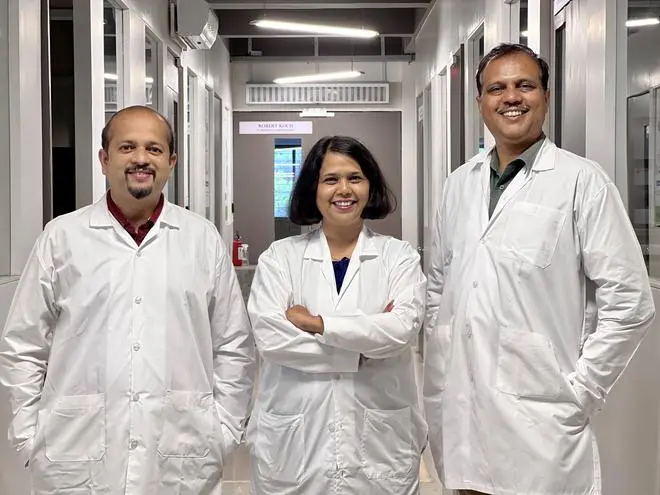Pune-based biotech start-up Bioprime AgriSolutions Pvt Ltd, which has launched 8 products to make crops climate-resilient, plans to soon launch nutrient-efficient products that will cut the plan’s requirement for synthetic fertilizers by 50 per cent. It is also planning to come up with India’s largest plant that will house all the microbes available within the country.
Company’s co-founder Renuka Diwan said, “This will help reduce the damage to the soil, impact on the environment and input cost for the farmers. It will reduce the carbon footprint of the food that we are producing.”
Inherent challenges
Launched in 2016, the company works to make plants avail of, absorb and utilise nutrients at least 20 per cent more than the current 30 per cent. “There are microbes which break the complexes and make sure that the nutrient can be absorbed by the plant. But there are inherent challenges with microbes as you cannot mix them with fertilizers, otherwise they will die,” the company’s co-founder told businessline in an online interaction.

Renuka Diwan, co-founder of Bioprime, flanked by her other co-founders Amit Shinder(on her right) and Shekhar Bhosale
Microbes need to be present in the soil when the fertilizer is applied, but its application and the survival of microorganisms are a challenge.
Currently, the company is working on this with different universities. “With a 25 per cent and a 50 per cent reduction in fertilizer, we are able to get the same amount of yield or slightly better yield without compromising plant health,” Diwan said.
Rise in yield
The company, which works with 11.5 lakh farmers across the country, has followed up with large trials with corporate firms such as ITC, where fertilizers were reduced by 35 per cent as farmers were reluctant to cut the usage much. “Farmers were able to increase yield by 10 per cent. The product will be launched in 2-½ months,” Diwan said, adding that all the products can be applied through drip irrigation or coated on top of granules such as bentonite granules or clay granules.
Bioprime has done studies on nutrients for tomatoes, sugarcane, soyabean, rice, cotton and wheat with universities. “We are doing some studies in plantation crops such as tea and coffee. We are doing a substantial amount of validation on the ground. We will introduce them after June,” she said.
Bioprime has applied for registration of these products and is awaiting clearance. By the time the clearance comes, the company — which is present in Uttar Pradesh, Bihar, Gujarat, Rajasthan, Andhra Pradesh, Telangana, Tamil Nadu and Karnataka — expects to complete its pilot projects.
Expansion plans
“We are starting work in Odisha with government support. We will start this soon,” she said.
On the company’s expansion plans, Diwan said it would first set foot in South-East Asia where the climate is similar to India. “We are setting up our product regulatory trials in the US and exploring the African market. We plan to take the products abroad,” Diwan said.
Bioprime — which has three baskets of products that can make crops stress-tolerant, climate-resilient and reduce fertilizer requirements — is working on building India’s largest plant associated with the microbes library. “Wehave 15,000 microbes already in our kitty across 300 locations across Indiain conditions such as hot water spraying, sulphur, sprayings, glaciers, deserts and forests. So we are identifying microbes and understanding what their function or their contribution is in terms of ensuring the survival and fitness of the crops,” she said.
Holistic approach
The company’s scientists have studied the past 35 years of climate, crop and soil data. This helps it to bring microbes from biodiversity hotspots such as western ghats, the north-eastern region and the Himalayas.
“Plants and soils are collected in a specific manner so that the microbes are not destroyed. They are sent to the lab as quickly as possible. Once in the lab, they are exposed to almost 80 different treatments and pre-treatments so maximum microbes can be got from the plant and soil,” Diwan said.
“We have some products (based on microbes) in the pipeline that we would be commercialising soon. We are also looking at microbes that can fix nitrogen along with sequestering carbon. We are looking at a holistic approach to produce food in a sustainable manner,” the company’s co-founder said.
“Our goal is to offer relief to farmers struggling with crop loss, temperature fluctuations, drought, resilient insects and diseases,” said Diwan, whose company prefers to work with the farmers, seed companies and value chains to understand the problems.
El Nino experience
Interestingly, the company was launched in an El Nino year — 2016 — when the founders saw high temperature fluctuations in a nearby tomato growing belt, one of Asia’s largest at Narayangaon near Nashik. “Due to the high temperature, farmers lost nearly 96 per cent of the crop and this was a trigger point for us. We asked farmers why they were not using this or that and their response was that they haven’t heard of such things,” she said.
Bioprime founders then started digging into products available in the market and found to their surprise that popular research work had not been converted into products. “That was the moment for us. We said this is exactly where we need to be. So, we wrote a proposal to the Department of Biotechnology (DoBT) and got a proof of concept funding where we said that based on the plant’s communication system,” Diwan said.
Plant communication
It is a system where a plant recognises conditions such as stress, disease attack and pest attack and it communicates within itself and to neighbouring plants what kind of situation it is in. The situation can be for using those trigger molecules. “We can identify these trigger molecules and use them as formulations to make crops climate resilient. We got the DoBT funding and that is how we started,” the Bioprime co-founder said.
Explaining the concept, Diwan said , for example, if a leaf is getting eaten by cattle or an insect, it needs to send a communication throughout its entire system that it is being eaten, so the plant can mount a defence. “This is like a cascade of communications and it’s very precise. These are small biomolecules and a combination of these biomolecules actually are precise in communicating whether a plant is healing, feeling heat, lacks water, being attacked by fungus or being eaten,” the Bioprime co-founder said.
The communication goes out to neighbouring plants too. It was the hypothesis for which the DoBT funded. Since then, the company has progressed and come up with products based on the hypotheses. “The products have worked well and are appreciated by farmers,” she said. What actually the company does is that in a farm not all the crop is lost. It picks up the plant that has survived and the one that has not before looking at other plants in the vicinity.
Corporate tie-ups
“For example, the crops may be finding it very tough, but the weeds are thriving in the same environment and same soil. We compare this by layering data on top of one another and see what is different or similar. So that gets us to an understanding of processes the plant uses to overcome these conditions. This is basically how we discovered the molecules,” Diwan said.
Bioprime, which has tie-ups with four corporates and is in talks to rope in two more, has come up with formulations using these molecules. “Like to get over drought we have one molecule. There are 4-5 different processes that the plants need to do before it can become drought-tolerant or can become heat-tolerant. So a bunch of these molecules are required to address one condition. So in this way we have built a library of 10,000 signalling molecules,” she said.
According to Diwan, the company’s products ensure that there is an assurance of yield for the farmer even in the worst kind of conditions so that farming will no longer be a gamble.








Comments
Comments have to be in English, and in full sentences. They cannot be abusive or personal. Please abide by our community guidelines for posting your comments.
We have migrated to a new commenting platform. If you are already a registered user of TheHindu Businessline and logged in, you may continue to engage with our articles. If you do not have an account please register and login to post comments. Users can access their older comments by logging into their accounts on Vuukle.